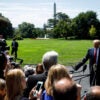People of faith should serve an essential role in the secular world. The political sphere needs contact with the transcendent insights of religion.
That’s according to Rev. Barry Black, Ph.D, a retired two-star admiral and 62nd Chaplain of the United States Senate, at an event hosted by Heritage President Jim DeMint.
“If there’s one place on the planet where prayer is needed, it’s Capitol Hill,” said Chaplain Black. Individuals of faith should allow their beliefs into every part of their lives, he continued:
Who we are as spiritual beings must follow us into the workplace. Seventy-five percent of our biblical heroes and heroines were involved in secular occupations, and yet were able to bring the spiritual into those occupations.
He said there are three appropriate, essential, humble ways believers should influence the secular world: being salt and light, witnessing without words, and living to serve.
We are to be salt and light if we are to glorify God in the workplace. Your presence in the workplace, bringing who you are as a spiritual being, should make the workplace a more secure environment.
Illuminate, make a difference, by the insights you bring based upon the knowledge you have of sacred Scripture. Many times, you don’t give chapter and verse of course, but simply paraphrasing a biblical insight will help you be a force for good.
But when is it appropriate for believers to be a loud witness, to take a stand and make their voices heard? Chaplain Black cited Aristotle’s Rhetoric as a guide for effective persuasion, using character, or Ethos, as the initial means to change hearts and minds.
Ethos is being perceived as ethically congruent, and that’s what witnessing without words is about. The problem is, we are often loud before we have the prelude of the silent witness of our integrity and our sensitivity, particularly to the marginalized.
There is a time for a louder witness, but that should be preceded by a lot of loving, a lot of serving.
As a participant in the civil rights movement, Chaplain Black spoke from his experience as both a witness without words and a loud witness. His 2006 book, From the Hood to the Hill, recounts his story of overcoming unpromising beginnings in the ghettos of Baltimore to serve nearly 30 years in the Navy, becoming a Rear Admiral with a Ph.D and now, Chaplain of the United States Senate.
Chaplain Black offered insights on the struggles faced by military chaplains today, particularly on protecting the institution of marriage and conscience protections:
I can see many military chaplains having some problems because, to preach the passages of Paul with exegetical integrity would mean being accused of engaging in hate speech. So, this is a challenge that I think we’re going to have to deal with going forward.
He said believers should not fear to act creatively against threats to religious freedom. “There are creative ways that we can tackle any challenge that we face, and I think, win,” he said. “The harvest is white, but the laborers are few. So what do you do? Pray that the Lord of the harvest will send forth laborers. We need more committed laborers.”
“It doesn’t take a lot of folk to make a difference, it really doesn’t,” he said. “There is a powerful force in that little remnant that knows how to speed dial Heaven.”





























